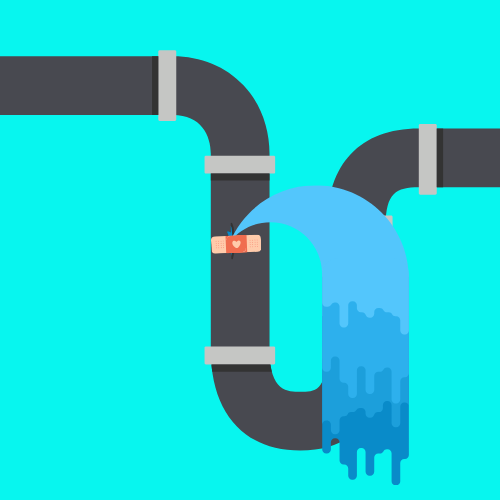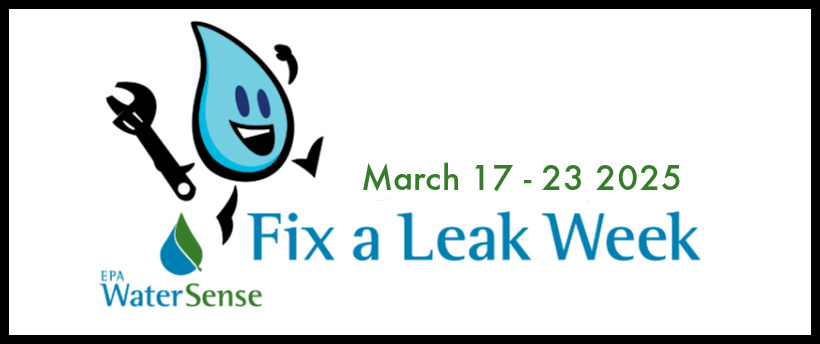Articles
FIX A LEAK AWARENESS
March 03, 2025

As the weather transitions into spring, it's the perfect time to take stock of your home's plumbing system and safeguard against leaks. Did you know that "Fix A Leak Week" is celebrated every March, highlighting the importance of detecting and repairing leaks to conserve water and prevent costly damage?
So, let’s explore how to identify leaks in your home, the EPA's recommendations for water leak sources, and the best ways to protect your property as we welcome the arrival of springtime.

Identifying Leaks
1. Check Your Water Meter: A sudden increase in your water bill could indicate a hidden leak. Take note of your water meter readings before and after a period of no water usage. If there's a discrepancy, you may have a leak.
2. Inspect Visible Pipes: Look for signs of water damage, such as water stains, mold growth, or peeling paint, near exposed pipes under sinks, behind appliances, and in basements or crawl spaces.
3. Listen for Dripping Sounds: Pay attention to any unusual sounds, such as dripping or running water, especially in areas where pipes are located. Even a small drip can indicate a hidden leak.
4. Check Toilet Tanks and Bowls: Add a few drops of food coloring to the toilet tank and wait to see if the color appears in the bowl without flushing. If it does, you likely have a leaky toilet flapper that needs replacing.
EPA Recommendations for Water Leak Sources
The Environmental Protection Agency (EPA) identifies common sources of household water leaks that homeowners should be aware of:
- Toilets: Leaky toilet flappers are a common culprit for water waste. Check for leaks by adding food coloring to the toilet tank and observing if it seeps into the bowl without flushing.
- Faucets: Dripping faucets can waste a significant amount of water over time. Replace worn-out washers or seals to stop the leaks and conserve water.
- Showerheads: A leaky showerhead can waste gallons of water per day. Ensure a tight seal by replacing worn-out gaskets or installing a water-efficient showerhead.
- Outdoor Irrigation Systems: Inspect outdoor sprinkler systems for leaks, clogs, or misalignments that could lead to water waste. Adjust sprinkler heads as needed to prevent overspray onto sidewalks or driveways.
Preventing Leaks
1. Schedule Regular Inspections: Arrange for a professional plumber to inspect your home's plumbing system annually. Early detection of leaks can prevent extensive water damage and costly repairs down the line.
2. Install Leak Detection Devices: Consider investing in smart leak detection devices that can alert you to potential leaks or abnormal water usage in real-time, giving you peace of mind and allowing for prompt action.
3. Maintain Your Plumbing System: Regularly maintain your plumbing fixtures and appliances to prevent leaks. Replace worn-out washers, gaskets, and seals as needed, and schedule professional maintenance for your water heater and irrigation system.
4. Protect Outdoor Faucets: As spring brings warmer weather, be sure to inspect and insulate outdoor faucets and pipes to prevent freezing and potential leaks. Disconnect and drain garden hoses, and consider installing frost-proof spigots if necessary.
By taking proactive steps to identify and prevent leaks in your home, you can protect your property, conserve water, and save money on utility bills. As "Fix A Leak Week" reminds us, a little prevention now can go a long way in preserving our planet's precious resources and ensuring a sustainable future for generations to come.
Here's to a leak-free and water-wise spring season ahead!
Additional Articles
https://www.epa.gov/watersense/fix-leak-week.
https://19january2017snapshot.epa.gov/www3/watersense/pubs/fixleak.html
https://www.forsythco.com/Portals/0/DeptDoc/Water%20and%20Sewer%20Dept/Handouts
https://wildernesspsd.myruralwater.com/epa-leak-information

